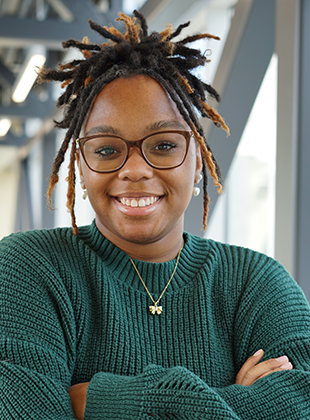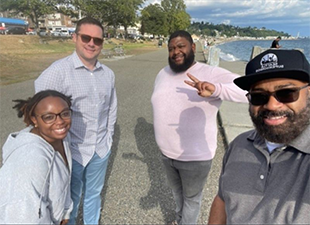Advancing youth justice at JMU and beyond
News
SUMMARY: The Innovation Center for Youth Justice (ICYJ) and Makaela Parker (‘25) are seizing opportunities to advance youth justice across the nation and cultivate the next generation of youth justice professionals through ICYJ's Summer Interrnship program.
“I am now able to use my voice to give a voice to those who feel silenced,” says Makaela Parker (‘25), a remarkable Justice Studies major and Youth Justice minor. Though she self-identifies as a shy person, she has grown at JMU, seizing opportunities to represent and lead her peers.
 Parker sits on the college-wide Student Advisory Council, where students help shape professional development opportunities, and is one of three student representatives to CAL's Alumni Advisory Board. As a member of Women of Color, a student organization for which she serves as co-Public Relations Chair, she found a safe space to identify with women who have had similar collegiate experiences and to become, she says, “comfortable in my skin as a Black woman.”
Parker sits on the college-wide Student Advisory Council, where students help shape professional development opportunities, and is one of three student representatives to CAL's Alumni Advisory Board. As a member of Women of Color, a student organization for which she serves as co-Public Relations Chair, she found a safe space to identify with women who have had similar collegiate experiences and to become, she says, “comfortable in my skin as a Black woman.”
Deep down, Parker “love[s] helping people and want[s] to make their lives better.” She grew up without much guidance about mental health and found being a first-generation college student difficult emotionally and financially. Her pattern of “figuring out things and struggling but getting back up,” always with her family’s unflagging support and pride, inspired her to channel that struggle into helping others. After first majoring in psychology, she found the youth justice minor and, eventually, the justice studies major, which gave her concrete ways to give others the kind of help she didn’t get as a child. “Recognizing that not everyone gets the opportunity to do the things that I have done makes me even more grateful to accept everything that is thrown at me,” says Parker.
Parker put her values into action when she became one of the Innovation Center for Youth Justice’s (ICYJ) first summer interns. As a center dedicated to youth justice system reform, JMU’s ICYJ devotes substantial effort to cultivating the next generation of youth justice professionals. Under the leadership of director Rita Poteyeva, associate professor of justice studies, the ICYJ developed their Summer Internship program in partnership with the Robert F. Kennedy National Resource Center for Juvenile Justice, drawing on that center’s substantial “practice network” of youth justice practitioners nationwide working in law, juvenile justice, child welfare, law enforcement, behavioral health and education.
The first cohort of interns spread across four states — Virginia, Illinois, Nebraska and Washington — and experienced all aspects of a functioning juvenile justice system. Students shadowed juvenile court intake staff, probation officers and service providers; visited detention facilities; and sat in on trial hearings and treatment assessments.

Parker interned in Seattle, WA — farther than she had ever traveled before — at the King County Juvenile Court Services under director Paul Daniels, whom Parker calls “truly a ray of sunshine.” His eagerness to teach made her eager to learn, and his team and everyone within Juvenile Court Services welcomed her. Daniels remarks that Parker “wasted no time building relationships, learning from a great variety of King County stakeholders and partners, and work[ing] directly with a multitude of programs.”
Daniels describes Parker as “brilliant, curious, insightful, [someone who] will certainly lead an impactful career wherever she chooses to apply her talents,” and she has already begun to have that impact at JMU. ICYJ interns keep a daily journal and write a major research paper bridging academic research and their on-the-ground observations. Parker brought back a treasure trove of meticulously documented practical observations, comparisons and research insights to share with fellow Youth Justice minors. “ICYJ could not be more proud of Makaela and how well she represented JMU while completing her internship in Washington,” says Poteyeva. The center invited Parker to present her high-caliber research paper, “Issues of adolescent developmental & mental health in the context of juvenile justice interventions," at the ICYJ Spring '24 Research and Practice Symposium.
Sixteen JMU students have completed internships through ICYJ’s program from majors including Education, Justice Studies, Political Science, Psychology, Social Work and Sociology. For Parker, it was “the most beneficial experience I have had in my JMU career. It allowed me to grow as an individual and a student, and to understand the role I want to have in a workplace.”
During her senior year, she will serve as an Outreach and Engagement Student Assistant in JMU’s Office for Diversity, Equity and Inclusion, assisting with community engagement and outreach efforts, including events for underrepresented communities. After graduating, Parker plans to pursue a Master of Education in School Counseling to continue working with youth. As the ICYJ internship program grows, so too will the impact of these JMU students on the communities they serve.
